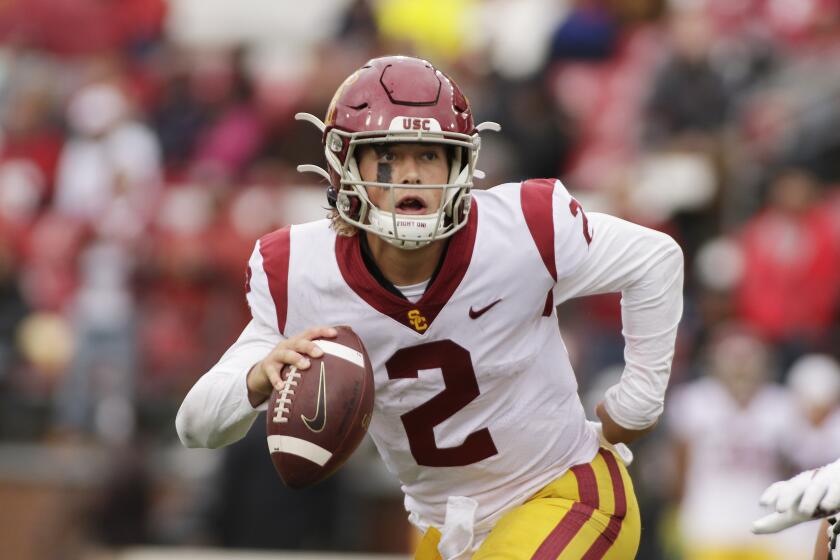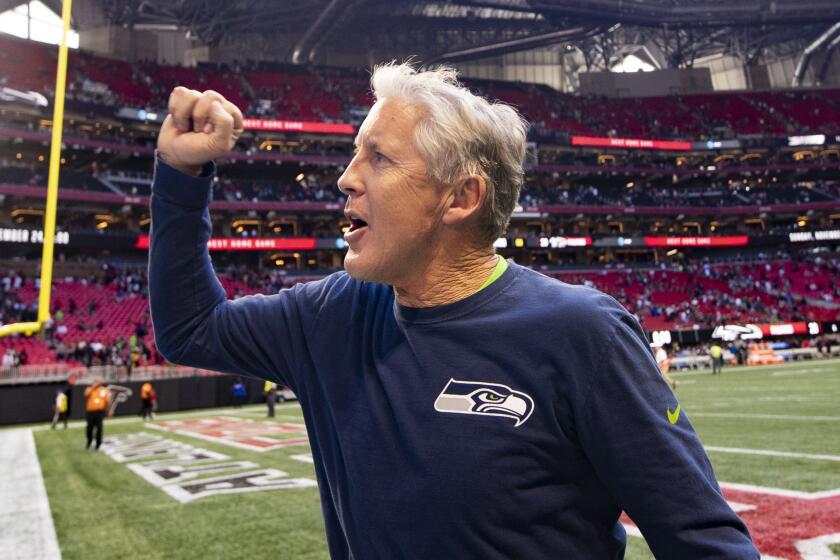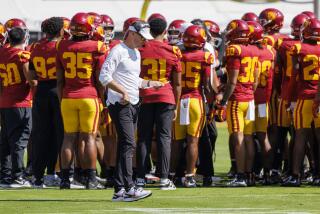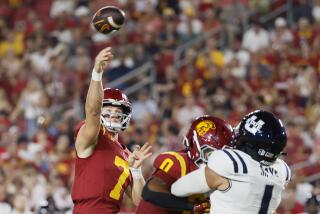USC football midseason report: What’s gone right and wrong for the Trojans
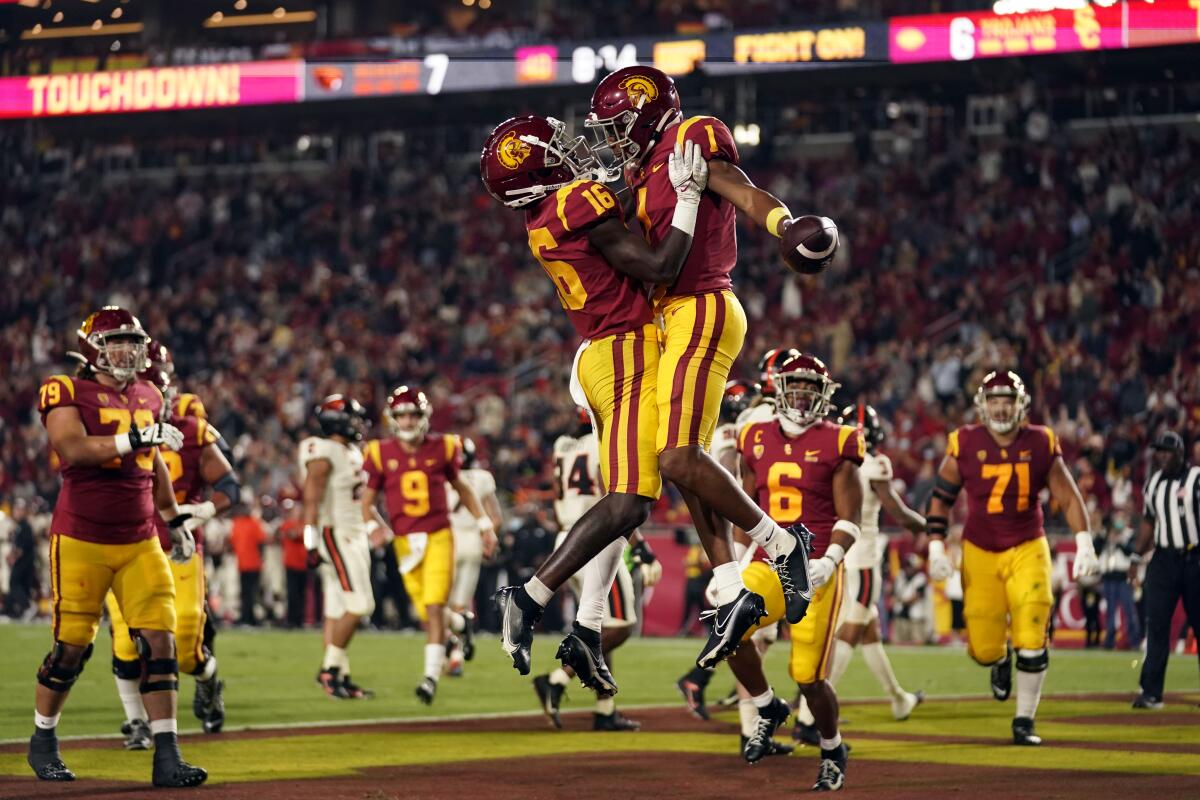
- Share via
By the midway point of a season quickly descending into disaster, Donte Williams was willing to try anything to change USC’s football fortunes.
“I even tried to wear my white shoes and channel my inner Pete Carroll,” Williams joked this week at practice, pointing at his new footwear. “Whatever it takes right now.”
With a much-needed bye week upon USC, Williams could certainly use some of that mid-2000s magic right now.
Setting aside the decision to part ways with Clay Helton after Game 2, let’s take a look at where the Trojans stand at midpoint of the season.
What went right
Quarterback Jaxson Dart continues to make progress but USC interim coach Donte Williams did not specify if the freshman will be ready by the Notre Dame game.
1. Drake London has emerged as one of the nation’s top receivers.
It’s tempting to just list London’s accomplishments to fill this space — most contested catches, most receptions in the nation (64), second-most receiving yards (832) — but we’ll spare you a long list of numbers. Just know this: London has been a force to be reckoned with so far this season.
His combination of size and skills and smooth route running has discombobulated defenses, making him nearly impossible to cover with just one man. That extra attention has, in turn, opened up opportunities for the rest of USC’s offense. London has had at least nine catches and 130 yards in five of USC’s six games — remarkable consistency considering how defenses have focused gameplans on stopping him, going so far as to take regular cheap shots.
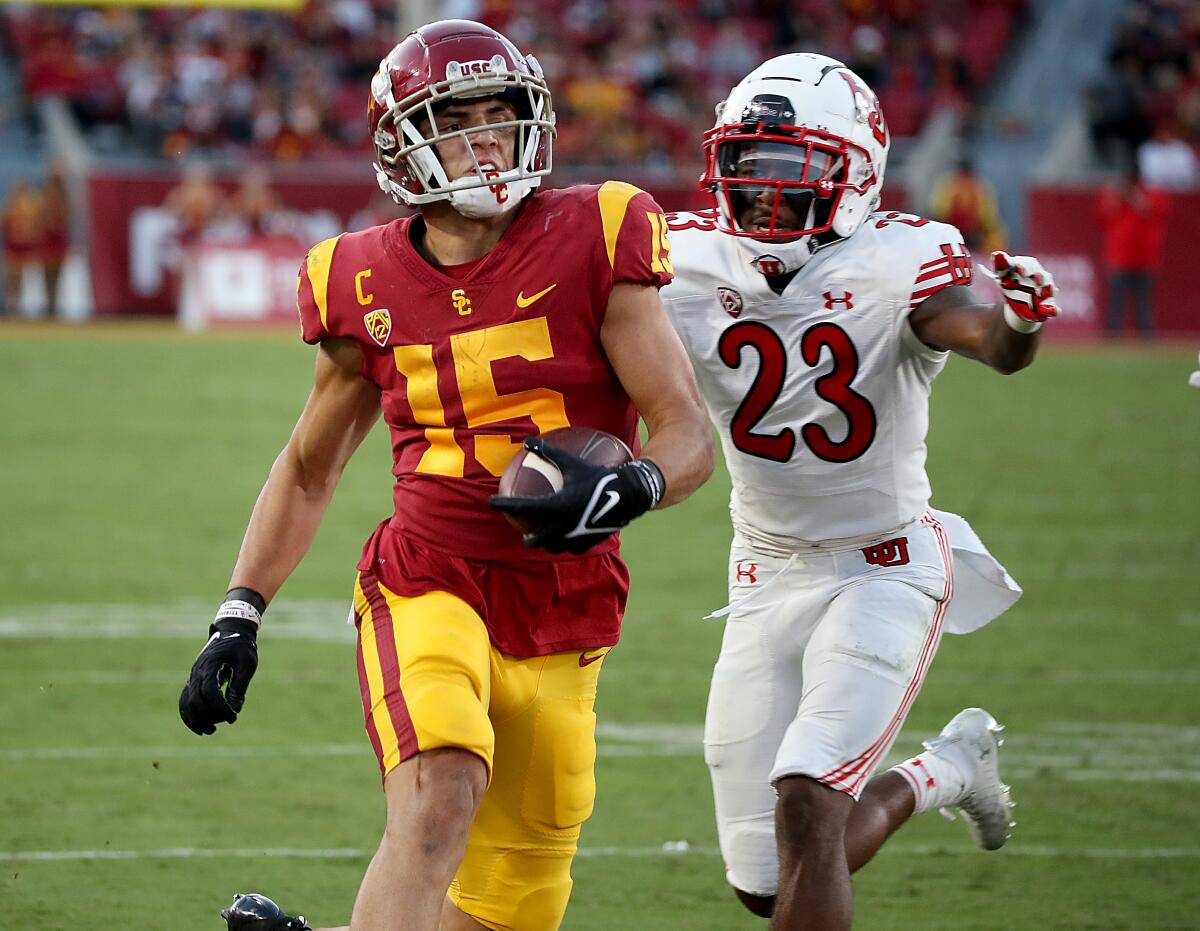
No defense has figured out how to stop him yet, even as they’ve figured out the rest of USC’s offense. On a better team, his prolific stats might’ve warranted Heisman Trophy buzz by now. But London may have to settle for just being a truly great college receiver who dominated during a not-so-great season on his way to the draft.
2. The run game has actually improved.
USC’s rushing attack had been on a downward trajectory for years, before it finally bottomed out last season as the Trojans could barely scrounge together 97 yards per game, good for 120th in the nation.
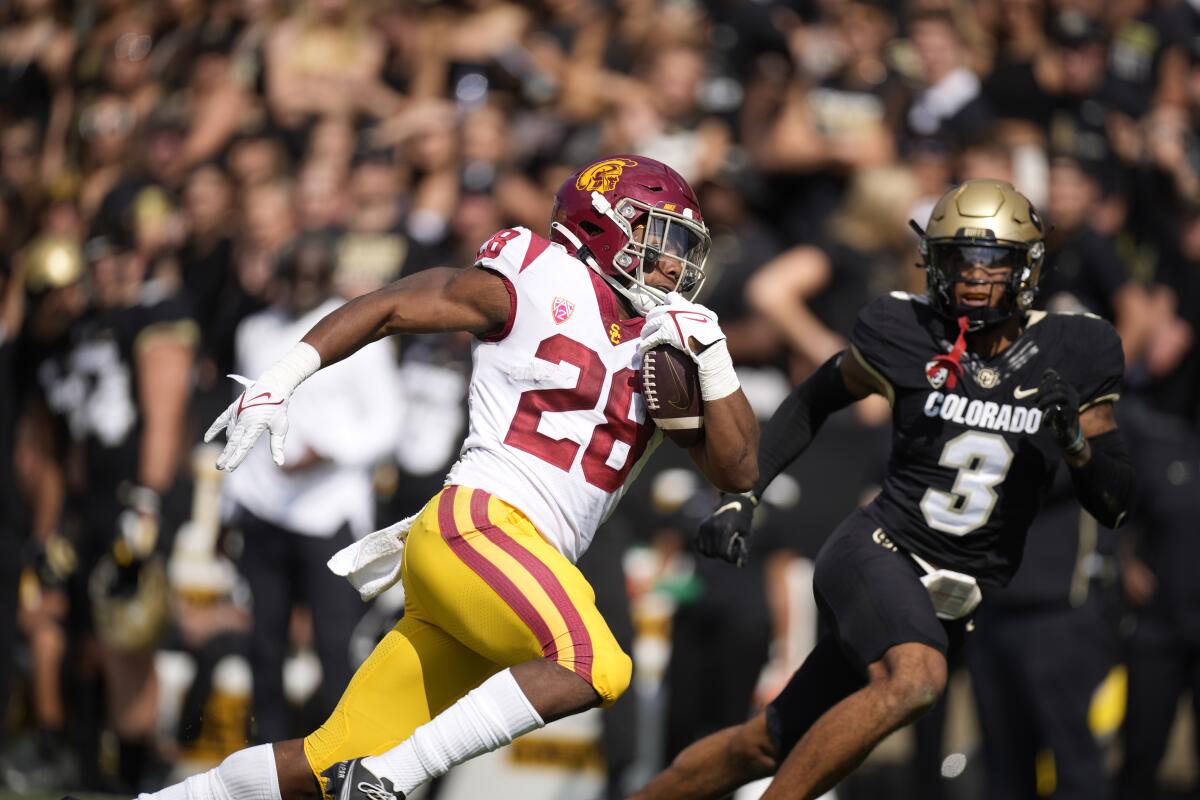
Enter two transfer backs from Texas in Keaontay Ingram and Darwin Barlow. Ingram has been a major upgrade as the lead back, while Barlow has proven himself worthy in recent weeks of supplanting Vavae Malepeai in the primary change-of-pace role. Together, they’ve given USC a passable rushing attack, which is more than USC could say it had in recent years.
Ingram has been the linchpin of that progress. A violent runner capable of shaking off tacklers, his presence in the backfield has made moving the offense easier on quarterback Kedon Slovis. Ingram already has 16 plays of 10 or more yards this season, which is just two fewer than the entire USC backfield had through its six games last season.
His emergence has been aided by better run blocking up front, which is a testament to first-year offensive line coach and run game coordinator Clay McGuire. But Ingram deserves a ton of the credit for finally making opposing defenses respect the run … that is, until USC has been forced to pass to try to quickly erase deficits.
3. The future is safe in the hands of freshman Jaxson Dart.
It was just one game, but boy was it a heck of a game. In a dynamic debut for the ages against Washington State, Jaxson Dart threw for 391 yards and four touchdowns, hobbling his way to a resounding road victory on an injured meniscus.
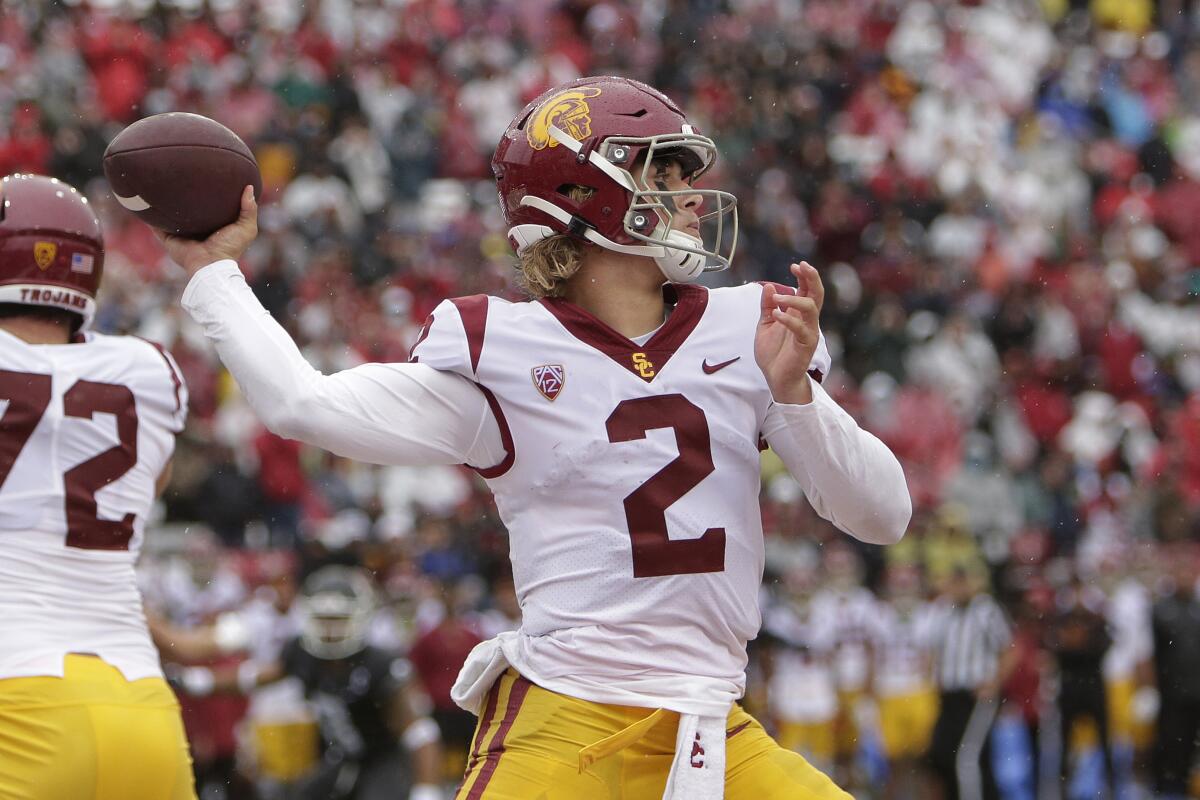
He hasn’t played a snap since, but the single-game performance was enough to back up what we thought was clear after fall camp: Dart is USC’s future at quarterback.
He may be its present, too, by the time USC returns from its bye. Dart is progressing at practice and nearing clearance from his injury, perhaps by the Notre Dame game next Saturday. It’s unclear if that means he’ll get a shot at the starting job, like Williams promised after the Washington State game. But his bright future beyond this season is good reason to retain some hope through 2021.
4. For what it’s worth, the offensive line has been better than expected.
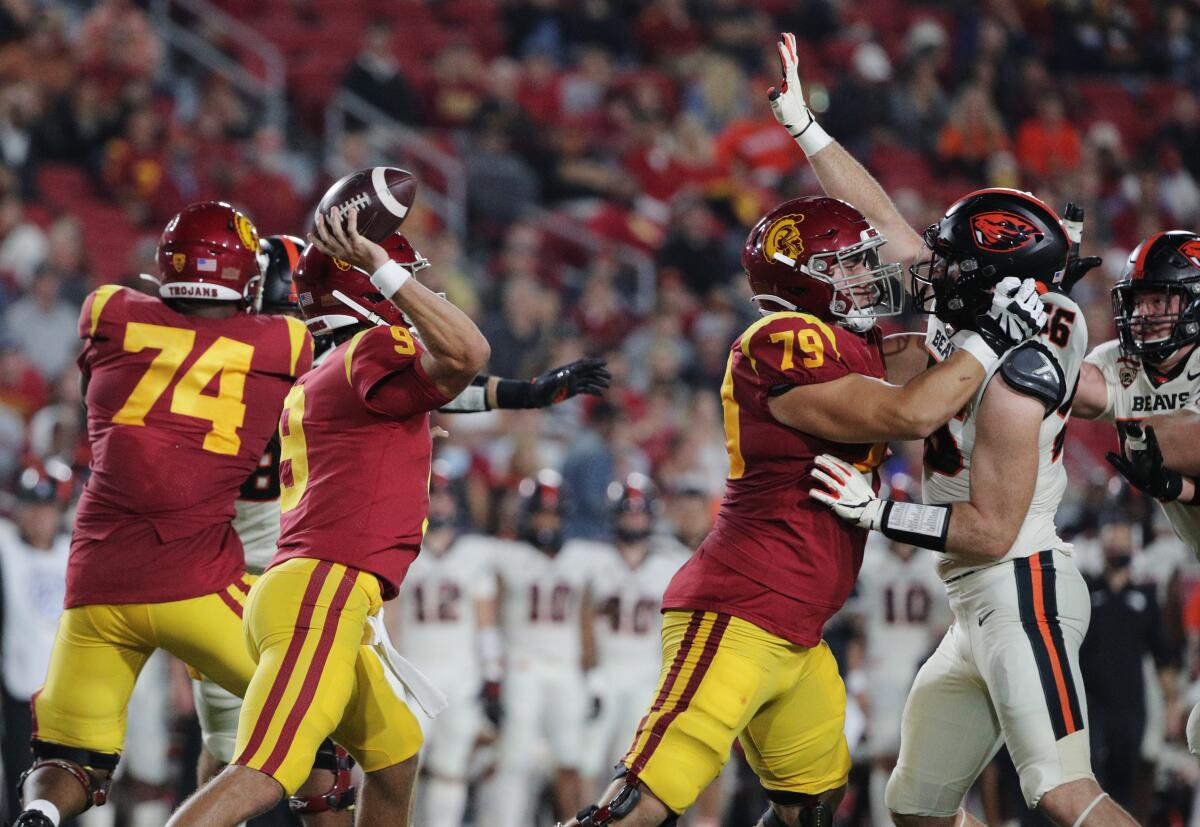
OK, so maybe it’s a backhanded compliment. But after expecting the worst, USC’s offensive line has at least exceeded those expectations.
USC was always going to take its lumps with two freshman offensive tackles. But Jonah Monheim has at least shown a propensity for run blocking on the right side of the line, while the interior has done well in that regard too, clearing more room than USC backs have been accustomed to in recent years.
Pass blocking, especially on the edges, has been a bit of a different story. But believe it or not, USC ranks among the top-20 teams in the nation in sacks allowed, having taken just seven so far this season.
I know, I was surprised too. But signs point toward both Monheim and left tackle Courtland Ford finding their stride sometime in the second half of the season.
What’s gone wrong
1. The USC defense has unraveled.
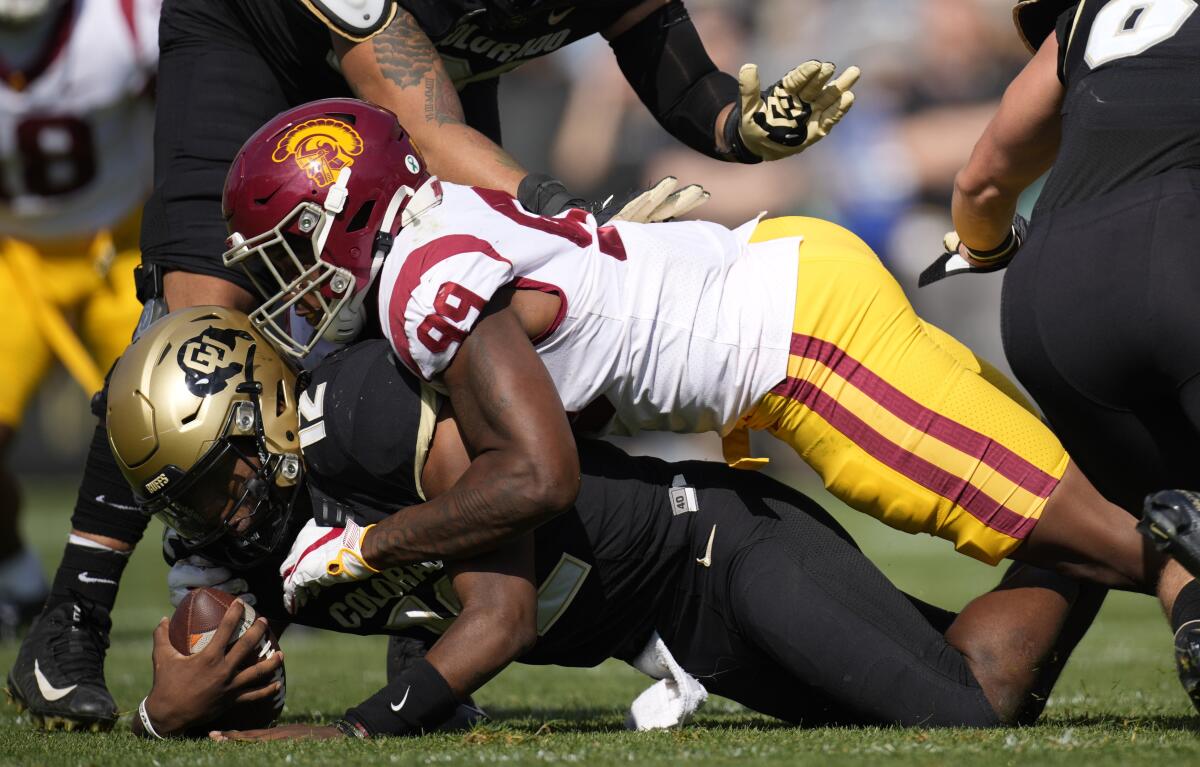
No need to isolate a specific part of USC’s defense. Depending on the week, it’s been trampled on the ground or picked apart through the air. What once looked like USC’s best chance to compete in the Pac-12 has now become its biggest question mark.
Its pass defense has underperformed in spite of its overwhelming talent, allowing 8.4 yards per pass attempt, which ranks worst in the Pac-12 and 112th in the nation. After looking fearsome in fall camp, a defensive front loaded with potential NFL talent has been just mediocre through the midway point of the season.
Edge rusher Drake Jackson has had brief brushes with greatness, tallying two sacks and a fumble recovery against Colorado, but he hasn’t been consistent like you’d expect from a potential first-rounder. Cornerback Chris Steele and safety Isaiah Pola-Mao, both key veterans, have struggled mightily after looking like sure draft picks themselves.
It’s difficult to diagnose what’s wrong with the defense because it’s been a different problem every week. But if USC doesn’t isolate the issue soon, it might only get worse from here.
2. No second option has emerged in the passing game.
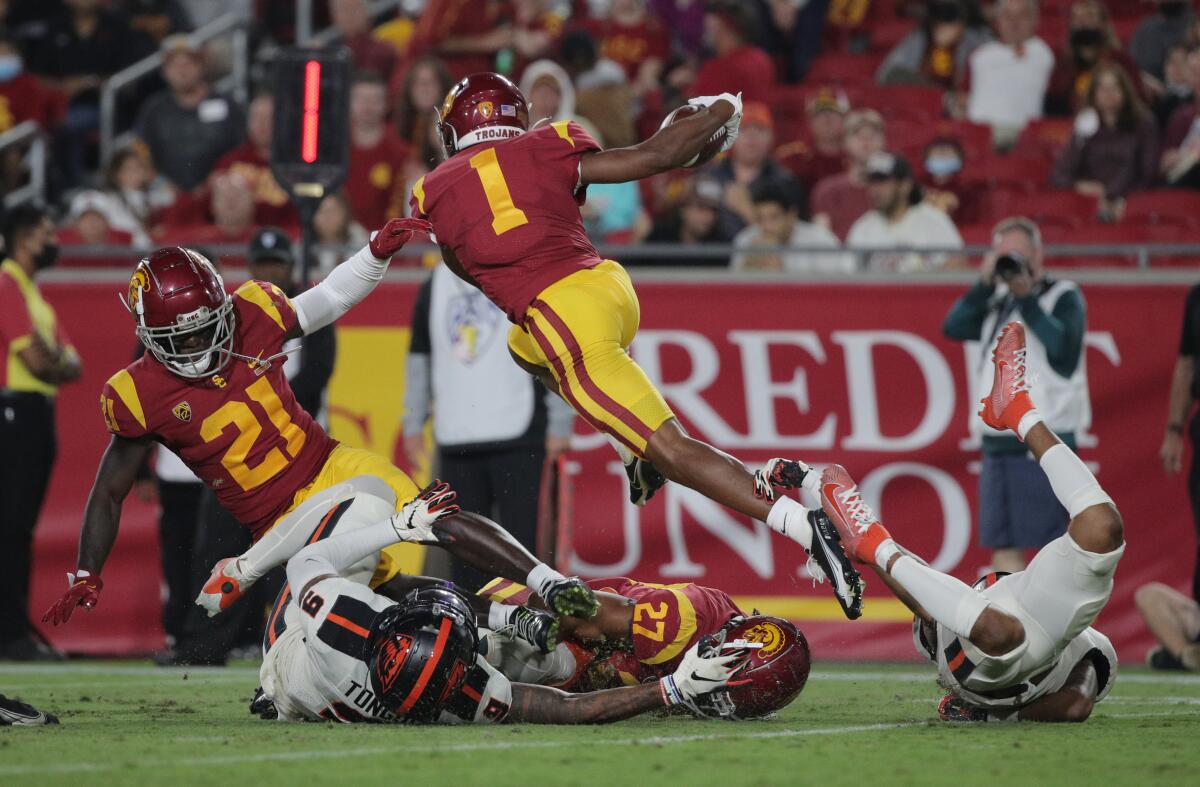
Bru McCoy was supposed to be the No. 2 option, but his suspension before the season left USC scrambling for another weapon. It’s still scrambling more than two months later.
Memphis transfer Tahj Washington was the likeliest option to fill that void, but he’s so far seemed miscast in USC’s offense. Gary Bryant Jr. has had his moments, but started slow due to a hamstring injury. And freshman tight end Michael Trigg appeared bound for a breakout role before a knee injury slowed him against Utah.
No one has taken the reins yet. But USC can’t keep asking Drake London to do it all. Defenses will adjust at some point.
The Trojans have plenty of top recruits in their receiving corps. At least one should be able to step up alongside London in the second half of the season.
3. The Trojans’ top freshmen haven’t lived up to their top billing just yet.
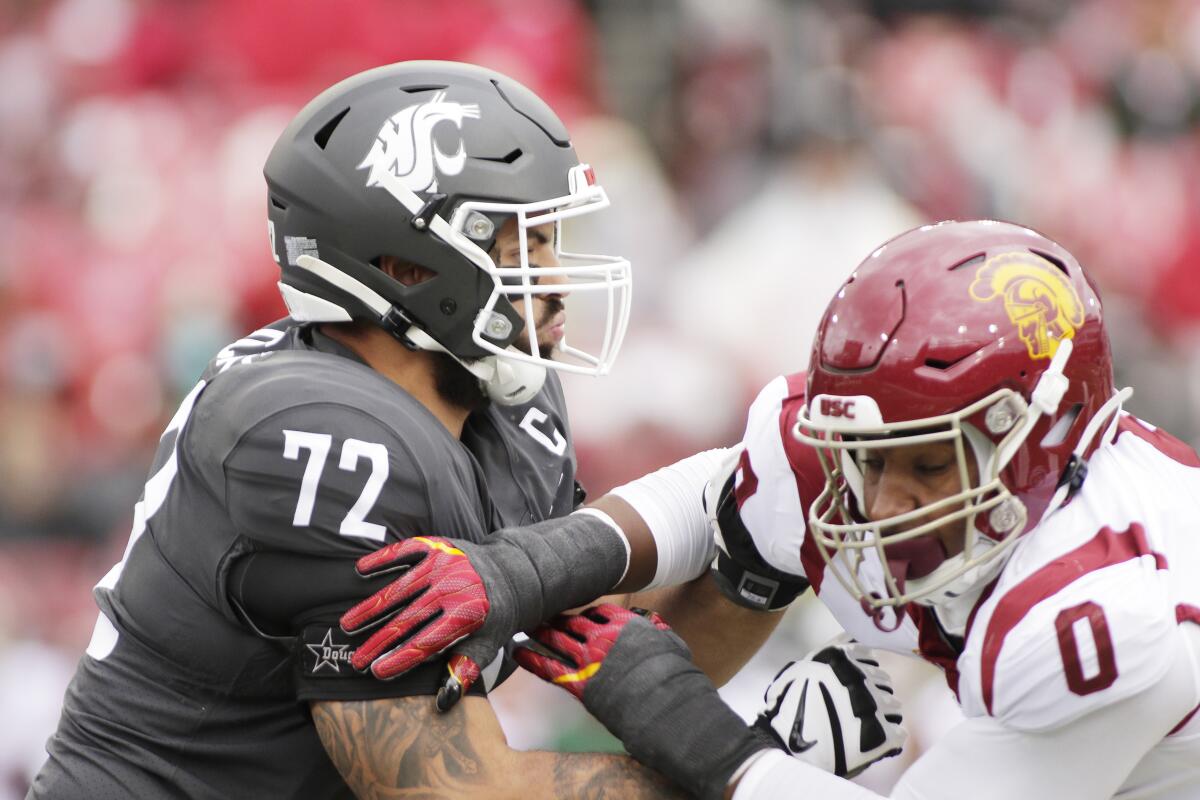
When Korey Foreman signed with USC, the athletic department wasn’t exactly subtle in announcing the freshman’s arrival. It did so with a billboard on campus, making it clear how prominently Foreman factored into the Trojans’ future plans.
But through six games, Foreman hasn’t figured that prominently on USC’s defense. The top overall recruit has averaged 11.5 snaps per game, the vast majority of which has come on obvious passing downs. Foreman got his first sack last week, but he still has plenty to prove to earn the coaches’ trust.
He’s not the only one. Raesjon Davis, the second highest-rated recruit in the Trojans’ 2021 class, has played a total of 11 snaps on defense this season, all of which came against San Jose State. After Foreman and standout safety Calen Bullock, defensive back Jaylin Smith has played the next-most among freshmen. But since reeling in a sack and interception against Washington State, Smith has played just three snaps.
Q&A: Pete Carroll on struggles of USC football since he left: “If you’ve got a masterpiece are you going to try to do it again? I don’t know. I think it’s a big challenge.”
4. Penalties are still a problem.
The broken record drones on. USC has somehow, some way managed to get worse in the penalty department. Only six teams in college football are losing more penalty yards per game than USC, which has lost 80.7 yards on an average of 8.2 penalties per game this season.
When Williams first stepped into his interim role, he promised to address USC’s discipline issues and improve accountability. But so far, he has not been able to stop the penalties. USC had two of its most penalized games of the last three years under Williams’ watch.
More to Read
Go beyond the scoreboard
Get the latest on L.A.'s teams in the daily Sports Report newsletter.
You may occasionally receive promotional content from the Los Angeles Times.

